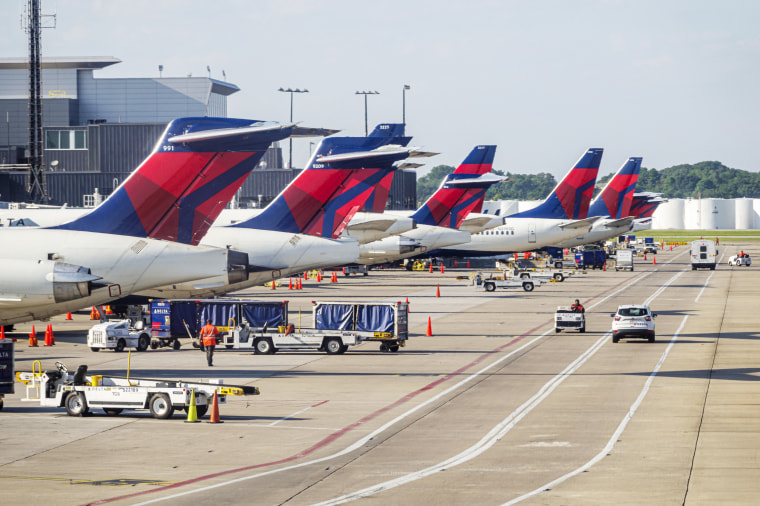Voting-rights advocates, desperate to derail the voter-suppression law crafted by Georgia Republicans, hoped corporate leaders would join the fight and sway the outcome. That did not happen, and Gov. Brian Kemp (R) last week signed into law a series of "reforms" that will place new barriers between Georgians and their democracy.
The larger political dispute, however, is not over. Yesterday, the CEOs for Delta Airlines and Coca-Cola -- both of which have corporate headquarters in Georgia -- publicly condemned the new, GOP-imposed voting restrictions for the first time.
On Wednesday morning, Delta CEO Ed Bastian said in a memo to employees that the law is "unacceptable and does not match Delta's values." ... "Let me be crystal clear and unequivocal: this legislation is unacceptable," Coca-Cola CEO James Quincey said later that day on CNBC.
Quincey added yesterday, "This legislation is wrong, it needs to be remedied, and we will continue to advocate for it both in private and now, even more clearly in public."
Delta's statement, meanwhile, went on to say, "After having time to now fully understand all that is in the bill, coupled with discussions with leaders and employees in the Black community, it's evident that the bill includes provisions that will make it harder for many underrepresented voters, particularly Black voters, to exercise their constitutional right to elect their representatives. That is wrong."
Bastian added, "The entire rationale for this bill was based on a lie: that there was widespread voter fraud in Georgia in the 2020 elections. This is simply not true. Unfortunately, that excuse is being used in states across the nation that are attempting to pass similar legislation to restrict voting rights."
While Microsoft is not based in Georgia, the tech giant does plan to expand its presence in Georgia, and yesterday its president, Brad Smith, also publicly criticized the state's new anti-voting law. Smith said, among other things, that it is "clear" to Microsoft that the new law contains provisions that "needlessly and unfairly" make it harder to cast ballots.
For opponents of the Georgia measure, the statements were welcome, but late. This was a step in an encouraging direction, but what's less clear is whether these corporate leaders can help force a change in Georgia, and whether they can help play a constructive role in protecting voting rights elsewhere.
If, for example, private-sector giants like Coca-Cola and Delta started lobbying in support of the "For the People Act" (H.R.1/S.1), it might very well help in preventing other states from following Georgia's lead.
But just as notable is how Republicans responded yesterday. By midday, there were reports that GOP state legislators were prepared to penalize their corporate critics for taking a stand in support of voting rights.
"This is the level of anger that makes people creative," one Georgia Republican said yesterday afternoon. "That should scare the s**t out of them."
The Atlanta Journal-Constitution reported overnight that the GOP-led state House did, in fact, vote shortly before midnight to scrap a $35 million jet-fuel tax break that Delta currently enjoys. Stating the obvious, a Democratic lawmaker said the move was "purely retaliation for the business community speaking out on a bill everyone feels is Jim Crow 2.0."
The AJC article added that state House Speaker David Ralston (R) "made no effort to hide" the fact that the vote to scrap the tax break "was payback." Ralston was quoted saying, "You don't feed a dog that bites your hand."
As it turns out, the bill stalled in the state Senate and won't become law, at least not anytime soon, though one GOP state senator, Jason Anavitarte, expressed disappointment that he wasn't able to vote for it. "I wanted to send Delta a message," he said.
That message, evidently, was that Georgia Republicans not only want to make it harder to vote, they'll also retaliate against private-sector allies who dare to criticize -- not take any meaningful action, just criticize -- voter-suppression measures.
None of this is healthy in a democracy.
Postscript: If some of this sounds vaguely familiar, we followed a story in 2018 in which Georgia Republicans also penalized Delta when the airline responded to a mass shooting by ending a discount for NRA members. Delta, one of Georgia's largest private employers, eventually regained the tax break.

